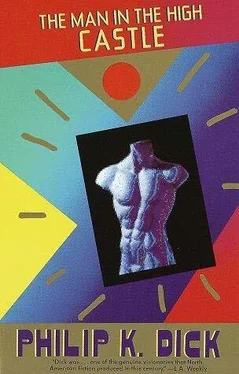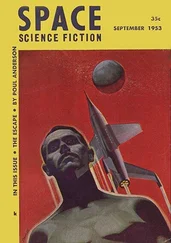“Thank you,” Robert said. It was all he could say. Lunch, in one of the downtown businessmen’s fashionable restaurants. He and this stylish modem high-place young Japanese. It was too much; he felt his gaze blur. But he went on examining the book and nodding. “Yes,” he said, “this does look interesting. I would very much like to read it. I try to keep up with what’s being discussed.” Was that proper to say? Admission that his interest lay in book’s modishness. Perhaps that was low-place. He did not know, and yet he felt that it was. “One cannot judge by book being best seller,” he said. “We all know that. Many best sellers are terrible trash. This, however—” He faltered.
Betty said, “Most true. Average taste really deplorable.”
“As in music,” Paul said. “No interest in authentic American folk jazz, as example. Robert, are you fond of say Bunk Johnson and Kid Ory and the like? Early Dixieland jazz? I have record library of old such music, original Genet recordings.”
Robert said, “Afraid I know little about Negro music.” They did not look exactly pleased at his remark. “I prefer classical. Bach and Beethoven.” Surely that was acceptable. He felt now a bit of resentment. Was he supposed to deny the great masters of European music, the timeless classics in favor of New Orleans jazz from the honky-tonks and bistros of the Negro quarter?
“Perhaps if I play selection by New Orleans Rhythm Kings,” Paul began, starting from the room, but Betty gave him a warning look. He hesitated, shrugged.
“Dinner almost ready,” she said.
Returning, Paul once more seated himself. A little sulkily, Robert thought, he murmured, “Jazz from New Orleans most authentic American folk music there is. Originated on this continent. All else came from Europe, such as corny English-style lute ballads.”
“This is perpetual argument between us,” Betty said, smiling at Robert. “I do not share his love of original jazz.”
Still holding the copy of The Grasshopper Lies Heavy , Robert said, “What sort of alternate present does this book describe?”
Betty, after a moment, said, “One in which Germany and Japan lost the war.”
They were all silent.
“Time to eat,” Betty said, sliding to her feet. “Please come, two hungry gentleman businessmen.” She cajoled Robert and Paul to the dining table, already set with white tablecloth, silver, china, huge rough napkins in what Robert recognized as Early American bone napkin rings. The silver, too, was sterling silver American. The cups and saucers were Royal Albert, deep blue and yellow. Very exceptional; he could not help glancing at them with professional admiration.
The plates were not American. They appeared to be Japanese; he could not tell, it being beyond his field.
“That is Imari porcelain.” Paul said, perceiving his interest. “From Arita. Considered a first-place product. Japan.”
They seated themselves.
“Coffee?” Betty asked Robert.
“Yes,” he said. “Thanks.”
“Toward end of meal,” she said, going to get the serving cart.
Soon they were all eating. Robert found the meal delicious. She was quite an exceptional cook. The salad in particular pleased him. Avocados, artichoke heart, some kind of blue cheese dressing… thank God they had not presented him with a Japanese meal, the dishes of mixed greens and meats of which he had eaten so much since the war.
And the unending seafoods. He had gotten so that he could no longer abide shrimp or any other shellfish.
“I would like to know,” Robert said, “what he supposes it would be like in world where Germany and Japan lost the war.”
Neither Paul nor Betty answered for a time. Then Paul said at last, “Very complicated differences. Better to read the book. It would spoil it for you, possibly, to hear.”
“I have strong convictions on the subject,” Robert said. “I have frequently thought it over. The world would be much worse.” He heard his voice sound out firm, virtually harsh. “Much worse.”
They seemed taken by surprise. Perhaps it was his tone.
“Communism would rule everywhere,” Robert continued.
Paul nodded. “The author, Mr. H. Abendsen, considers that point, as to unchecked spread of Soviet Russia. But same as in First World War, even on winning side, second-rate mostly peasant Russia naturally takes pratfall. Big Laughingstock, recalling Japan War with them, when—”
“We have had to suffer, to pay the cost,” Robert said. “But we did it for a good cause. To stop Slavic world inundation.”
Betty said in a low voice, “Personally, I do not believe any hysterical talk of ‘world inundation’ by any people, Slavic or Chinese or Japanese.” She regarded Robert placidly. She was in complete control of herself, not carried away; but she intended to express her feeling. A spot of color, deep red, had appeared in each of her cheeks.
They ate for a time without conversing.
I did it again, Robert Childan informed himself. Impossible to avoid the topic. Because it’s everywhere, in a book I happen to pick up or a record collection, in these bone napkin rings—loot piled up by the conquerors. Pillage from my people.
Face facts. I’m trying to pretend that these Japanese and I are alike. But observe: even when I burst out as to my gratification that they won the war, that my nation lost– there’s still no common ground. What words mean to me is sharp contrast vis-à-vis them. Their brains are different. Souls likewise. Witness them drinking from English bone china cups, eating with U.S. silver, listening to Negro style of music. It’s all on the surface. Advantage of wealth and power makes this available to them, but it’s ersatz as the day is long.
Even the I Ching , which they’ve forced down our throats; it’s Chinese. Borrowed from way back when. Whom are they fooling? Themselves? Pilfer customs right and left, wear, eat, talk, walk, as for instance consuming with gusto baked potato served with sour cream and chives, old-fashioned American dish added to their haul. But nobody fooled, I can tell you; me least of all.
Only the white races endowed with creativity, he reflected. And yet I, blood member of same, must bump head to floor for these two. Think how it would have been had we won! Would have crushed them out of existence. No Japan today, and the U.S.A. gleaming great sole power in entire wide world.
He thought: I must read that Grasshopper book. Patriotic duty, from the sound of it.
Betty said softly to him, “Robert, you’re not eating. Is the food misprepared?”
At once he took a forkful of salad. “No,” he said. “It is virtually the most delicious meal I have had in years.”
“Thank you,” she said, obviously pleased. “Doing my best to be authentic… for instance, carefully shopping in teeny-tiny American markets down along Mission Street. Understand that’s the real McCoy.”
You cook the native foods to perfection, Robert Childan thought. What they say is true: your powers of imitation are immense. Apple pie, Coca-Cola, stroll after the movie, Glenn Miller… you could paste together out of tin and rice paper a complete artificial America. Rice-paper Mom in the kitchen, rice-paper Dad reading the newspaper. Rice-paper pup at his feet. Everything.
Paul was watching him silently. Robert Childan, suddenly noticing the man’s attention, ceased his line of thought and applied himself to his food. Can he read my mind? he wondered. See what I”m really thinking? I know I did not show it. I kept the proper expression; he could not possibly tell.
“Robert,” Paul said, “since you were born and raised here, speaking the U.S. idiom, perhaps I could get your help with a book which has given me certain trouble. Novel from the 1930s by a U.S. author.”
Читать дальше










